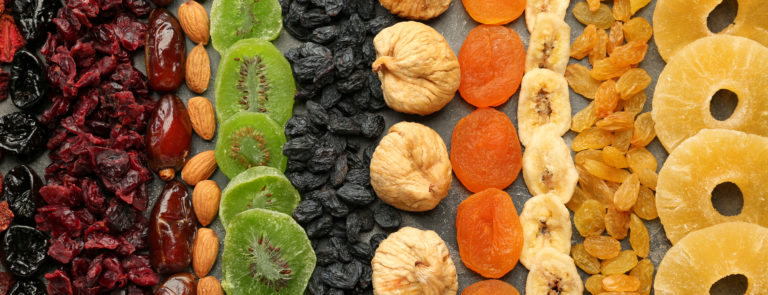15% off €35 OR 20% off €45
Code:SHOP
Dried fruits benefits

Whether it's with your cereals or enjoyed on the go as a healthy snack, dried fruit is a great way to get those nutrients in your diet. Find out more here!
Whether sprinkled on top of your favourite cereal or enjoyed on the go as a healthy snack, dried fruit is a great way to get those all-important nutrients in your diet. Plus, they taste delicious too.
However, dried fruit has a bit of a reputation. In recent years, the dried fruit market has been in decline, with many misconceptions driving us to choose other snacking options instead1.
The truth is, dried fruit can be a healthy addition to your diet when enjoyed in moderation. Whichever dried fruit you choose, these nutritional powerhouses pack a lot of punch into a small portion.
What is dried fruit?
The key to getting the most nutritional benefit from dried fruit is choosing the right type. Most traditional dried fruits are made by removing the water from the fresh fruit. The result is simply a dried version of fresh fruit, with no extra sugar or other ingredients added2. Some methods involve adding extra sugar before the drying process, or candying once the fruit has been dried. Added sugar can make the nutritional profile of your chosen fruit a lot more calorific, so it’s worth checking the ingredients and the nutrition information before you buy.Different benefits of dried fruits
As well as being a handy snack to have on-hand when you’re out and about, there is a range of different dried fruit health benefits to consider. These include:- Dried fruits tend to have more fibre than their fresh relatives, making them a great choice for those wanting to up their fibre intake.
- Most dried fruits include more phenols than fresh alternatives, which may contribute to a reduced risk of heart disease, diabetes, and other health conditions.
- Vitamins and minerals. As a concentrated version of fresh fruit, dried varieties often have higher levels of essential micronutrients (except for vitamin C)3 4.
The healthiest dried fruits to include in your diet
Like we mentioned above, it’s a good idea to choose dried fruit with no added sugars. These will likely give you the most health benefits without bringing too much unnecessary sugar into your diet. For very tart dried fruit options, like cherries, you could look for products that are naturally sweetened with juice before drying as a healthier alternative6. All dried fruit typically provides essential micronutrients and fibre. However, some of the healthiest options include:-
-
- Figs
- Prunes
- Apricots
- Raisins
- Dates
- Goji berries
- Cranberries 7 8
-



